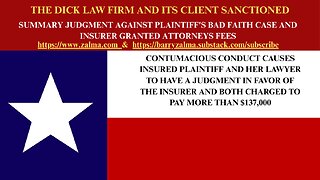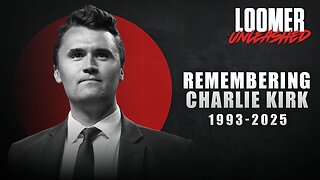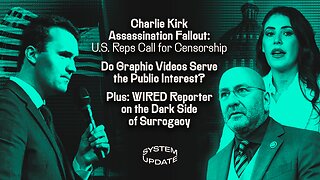Premium Only Content

Demands for Reasons for Termination not a "Claim"
A Claim by Any Other Name is not a Claim
Post 5182
It is Imperative that Insured Report Potential Claim to Insurers
In Jeffrey B. Scott v. Certain Underwriters At Lloyd's, London, Subscribing To Policy No. B0901li1837279, RLI Insurance Company, Certain Underwriters At Lloyds, London And The Insurance Company, Subscribing To Policy No. B0180fn2102430, No. 24-12441, United States Court of Appeals, Eleventh Circuit (August 25, 2025) the court explained the need for a claim to obtain coverage.
Case Background:
This appeal arises from a coverage dispute under a Directors & Officers (D&O) insurance policy. Jeffrey B. Scott, the plaintiff-appellant, was terminated from his role as CEO, President, and Secretary of Gemini Financial Holdings, LLC in October 2019. Following his termination, Scott threatened legal action against Gemini, and Gemini sent him letters accusing him of misconduct and demanding the return of company property.
Insurance Policy:
The D&O insurance policy issued by Underwriters at Lloyd's, London, provides coverage for directors, officers, and managers of Gemini. The policy defines a "Claim" as a "written demand for monetary damages, non-monetary, or injunctive relief against any of the Insureds". It also provides coverage if the Chief Executive Officer, Chief Financial Officer, or Chief Actuary (or equivalent position) of the company gives "notice of circumstances . . . that may reasonably be expected to give rise" to a claim.
Legal Dispute:
Scott submitted a letter to Lloyd's on November 23, 2019, entitled "Notice of Claim," enclosing Gemini's letters. Lloyd's denied coverage, determining that no "Claim" against Scott had been made under the policy. Scott sued Lloyd's for insurance coverage, but the district court dismissed the case. Scott's arguments included that his documents reflected a "claim" or a "notice of circumstances" for a future claim.
Legal Principles:
In diversity cases arising under Florida law, a federal court is bound by the law articulated by the Florida Supreme Court. Unambiguous policy terms are interpreted according to their plain meaning as written.
If the Florida Supreme Court has not spoken on an issue, Florida District Court of Appeals decisions control absent persuasive indication that the Florida Supreme Court would rule otherwise. As a matter of Florida law, unambiguous policy terms are interpreted according to their plain meaning as written.
The letters cited by Scott do not contain a demand for relief against him. They explain why, in Gemini's view, Scott was terminated and request that he preserve documents and return company equipment. The letters Gemini sent do not request monetary payment or legal remedies. Instead, they assert a cause for Scott's termination and outline expectations for his post-employment conduct. Viewed in the light most favorable to Scott, these letters are anticipatory posturing for a future dispute-an intention to "[review] certain workplace conduct by [Scott]." But they are not present demands for relief.
Scott's November 2019 letter did not identify circumstances that would lead to a claim against him. Instead, it mostly reflects his demands against Gemini over a putative wrongful termination. Scott was not one of the specified officers who could provide a notice of circumstances under the policy when he sent his November letter.
The district court correctly rejected Scott's arguments that his documents reflected a "claim," or, in the alternative, a "notice of circumstances" for a future claim.
Court's Decision:
The district court held that no "Claim" as defined in the policy was made against Scott during the policy period and that Scott did not provide a "notice of circumstances" to trigger coverage. The court also noted that the letters from Gemini did not request monetary payment or legal remedies but instead asserted a cause for Scott's termination and outlined expectations for his post-employment conduct. The Eleventh Circuit affirmed the USDC.
ZALMA OPINION
Insurance is nothing more than a contract like any other contract. It is interpreted by dealing with the usual meaning of the words used. Letters accusing a fired CEO of misconduct and demanding the return of company property was not a claim nor was the fired CEO's request for detail was a "claim" as defined by the policy. The threat, if made to an intelligent corporate officer or insurance consultant should have resulted in a potential "claim" but the insured did not advise the insurers of the potential claim.
(c) 2025 Barry Zalma & ClaimSchool, Inc.
Please tell your friends and colleagues about this blog and the videos and let them subscribe to the blog and the videos.
Subscribe to my substack at https://barryzalma.substack.com/subscribe
Go to X @bzalma; Go to Barry Zalma videos at Rumble.com at https://rumble.com/account/content?type=all; Go to Barry Zalma on YouTube- https://www.youtube.com/channel/UCysiZklEtxZsSF9DfC0Expg; Go to the Insurance Claims Library – https://lnkd.in/gwEYk.
-
 8:29
8:29
Insurance Law
14 days agoThe Dick Law Firm and its Client Sanctioned
48 -
 2:59:56
2:59:56
Laura Loomer
13 hours agoEP143: Remembering Charlie Kirk (1993–2025)
115K80 -
 58:04
58:04
Man in America
16 hours agoCharlie Kirk’s Assassination—An URGENT WARNING for America
125K176 -
 1:22:15
1:22:15
Glenn Greenwald
14 hours agoCharlie Kirk Assassination Fallout: U.S. Reps Call for Censorship; Do Graphic Videos Serve the Public Interest? Plus: WIRED Reporter on the Dark Side of Surrogacy | SYSTEM UPDATE #513
230K201 -
 1:48:36
1:48:36
Right Side Broadcasting Network
20 hours agoLIVE: President Trump Attends the Yankees Baseball Game - 9/11/25
210K29 -
 1:54:32
1:54:32
Badlands Media
14 hours agoBadlands Media Special Coverage - FBI Press Conference on Charlie Kirk's Assassination
171K21 -
 1:06:19
1:06:19
BonginoReport
15 hours agoManhunt Underway for Charlie Kirk’s Assassin - Nightly Scroll w/ Hayley Caronia (Ep.132)
343K274 -
 1:11:42
1:11:42
Flyover Conservatives
23 hours agoStructural Architect Destroys 9.11 Narrative... What Really Happened? - Richard Gage AIA | FOC Show
115K24 -
 1:51:14
1:51:14
Precision Rifle Network
19 hours agoS5E1 Guns & Grub - Charlie Kirk's "sniper"
67.2K21 -
 13:09:12
13:09:12
LFA TV
1 day agoLFA TV ALL DAY STREAM - THURSDAY 9/11/25
424K100